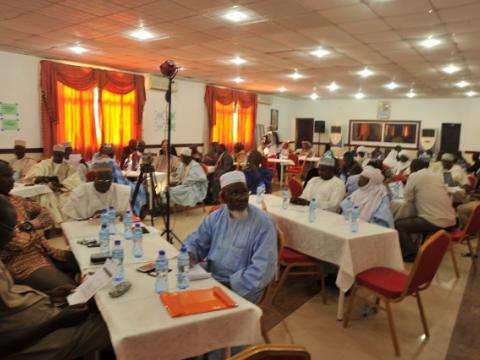Joint forces to prevent Ebola in Niger

The Ebola virus has invaded West Africa region and made thousands of victims. According to the World Health Organizationat least 8,274 people have died from the Ebola outbreak to this date. Many children are fatherless and motherless in the countries most affected Liberia, Sierra Leone, Guinea. Thousands of children who survived the fever no longer go to school because of the fear.
When Senegal and Nigeria, declared free of Ebola virus transmission due to effective community information, education initiatives and with the house-to-house campaigns as an integral component of the outbreak response in October Mali confirms its first case of Ebola. A two-year-old girl who later die, arrived from Guinea accompanied by her grandmother.
Taking in to account the regional situation the Niger government focuses primarily on prevention. Following WHO guidelines, World Vision Niger sensitize all staff, partners we work with, the communities where we operate through communication materials (leaflets, flyers, community radio developed by UNICEF).
As part of the government support on the Ebola prevention World Vision Niger organized a workshop with religion leaders in December 2014. The workshop essential aimed to better involve religious leaders from all regions of Niger in the prevention of disease by training them to better convey the message in their respective Muslim and Christian texts while respecting traditions and customs.The workshop was the first of its kind in the country. The approach used by World Vision is the Channel of Methodology (CoH) which has proven its effectiveness in the fight against HIV/AID.
In all countries of the world, faith is central to life; religious leaders are respected and listened to. They are an essential component of any society. In Niger, as elsewhere in Africa, mosques, temples and churches are the center of social life.
“In all countries of the world, faith is central to life; religious leaders are respected and listened to. They are an essential component of any society. In Niger, as elsewhere in Africa, mosques, temples and churches are the center of social life. Religious organizations and their networks have the potential to teach, raise awareness, in order to reduce confusion, rumors, ignorance and fear that lead to the spread of the virus." said Albert Kodio WV Niger National Director in his opening speech.
“The first impression I had was that we were up for an uphill battle to have such a combined Muslim Christian workshop that will try to demystify, correct and challenge deep seated religious beliefs. When I was made away of the Christian - Muslim sensitivity, my problem was worsened. However, having used the CoH tool for the past 12 years and seen the wonders it brings forth, I encouraged myself and assured my colleague all will be well. There was a very good measure of harmony over what to be done to prevent the spread of the Ebola infection. It was recognized and agreed that some religious practices we have held on to for a long time should be transformed in the face of Ebola. Both Muslims and Christians demanded that the manual should have both Islamic and Christian perspectives and scriptures. They both rejected the idea of two separate manuals - one with Christian quotations only and the other with Islamic quotes. To me and as expressed by other team members, this was a mile stone crossed” says Rev. Siyani Zimba, SAR Regional Channels of Hope Technical Advisor Christian Commitment Programs and learning Center and one of the workshop facilitators.
“As we closed the workshop, with the courtesy of the National Director, many sobering comments came from religious leaders. One such comment was that we should not only unite to fight Ebola and poverty, let us unite for Peace-building in the land. World Vision should also help us to unite around Peace-building. This comment was very humbling to me” added Rev. Siyani Zimba SAR Regional Channels of Hope Technical Advisor, Christian Commitment Programs and Learning Center.
Our population is close to religious leader and they listen to them. For that reason this is the best strategy for the eradication of the Ebola virus and even for building peace in the country.
“Our population is close to religious leader and they listen to them. For that reason this is the best strategy for the eradication of the Ebola virus and even for building peace in the country. Sometime our people are reticent when the information comes from the government, because they believe that the information is often import buy the west. When the information comes from our religious leaders they know that the leader will pass information according to the Koran or l’Hadis principals. We have to thank World Vision for thinking in the involving the religious leader in the fight against Ebola,” Says Dr, Boubacar Seydou Toure, Surgeon General of the Niger Islamic Association.
“The voice of the religious leader are important, they are respected. We think this is a good opportunity to train them about the danger related to the virus and for them to replicate the training in their own regions. After the training World Vision will continue to support the religious leader in their different regions, (Diffa, Maradi, Zinder, Dosso and Taua). We will be with them to make sure the population is inform about the Ebola Virus.” says Pastor Adama Diouf, Regional F&D Director in West Africa Regional Office.